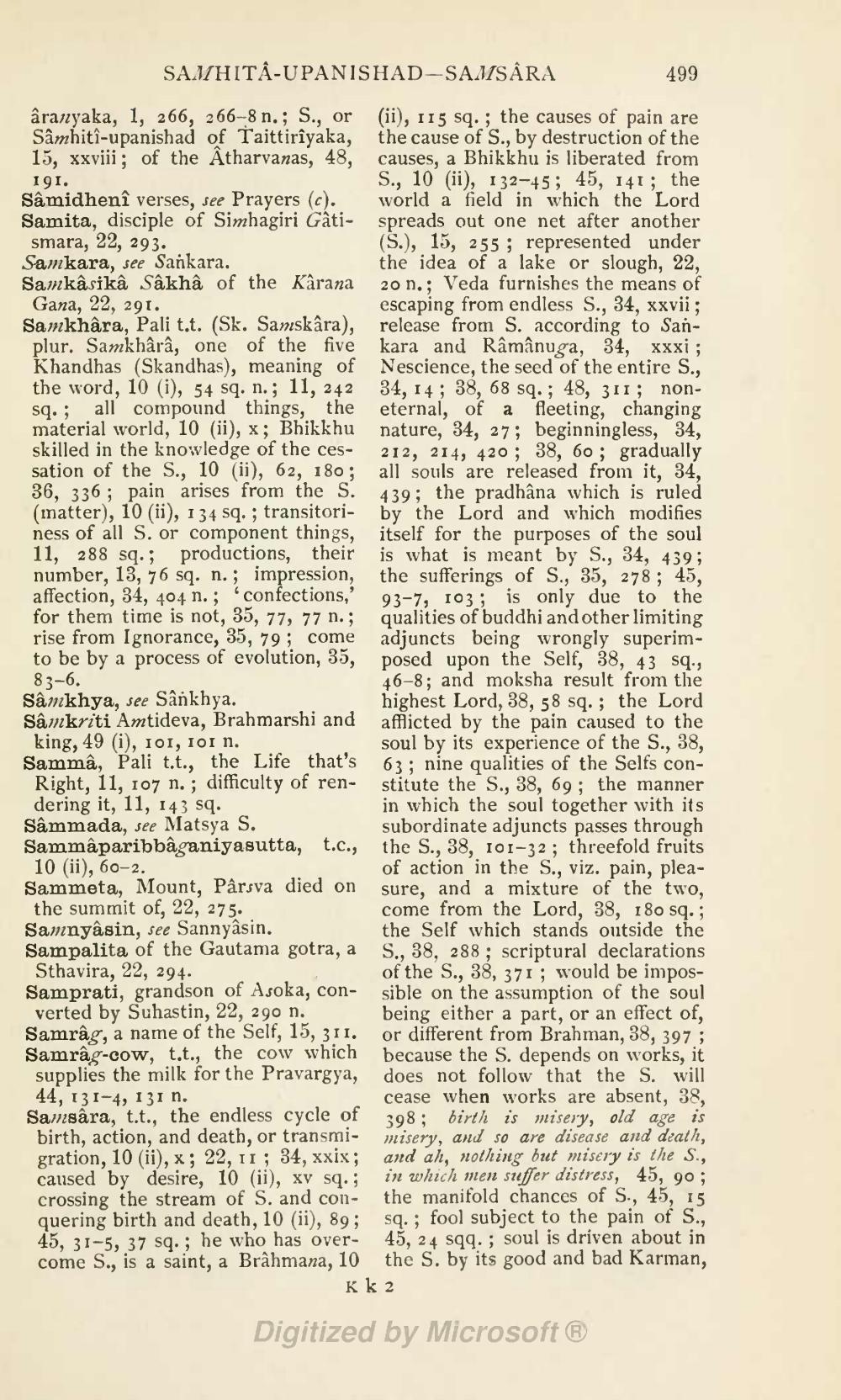________________
SAMHITA-UPANISHAD-SAMSÂRA
499
(ii), 115 sq.; the causes of pain are the cause of S., by destruction of the causes, a Bhikkhu is liberated from S., 10 (ii), 132-45; 45, 141; the world a field in which the Lord spreads out one net after another (S.), 15, 255; represented under the idea of a lake or slough, 22, 20 n.; Veda furnishes the means of escaping from endless S., 34, xxvii; release from S. according to Sankara and Râmânuga, 34, xxxi; Nescience, the seed of the entire S., 34, 14; 38, 68 sq.; 48, 311; noneternal, of a fleeting, changing nature, 34, 27; beginningless, 34, 212, 214, 420; 38, 60; gradually all souls are released from it, 34, 439; the pradhâna which is ruled by the Lord and which modifies itself for the purposes of the soul is what is meant by S., 34, 439; the sufferings of S., 35, 278; 45, 93-7, 103; is only due to the qualities of buddhi and other limiting adjuncts being wrongly superimposed upon the Self, 38, 43 sq., 46-8; and moksha result from the highest Lord, 38, 58 sq.; the Lord afflicted by the pain caused to the soul by its experience of the S., 38, 63; nine qualities of the Selfs constitute the S., 38, 69; the manner in which the soul together with its subordinate adjuncts passes through the S., 38, 101-32; threefold fruits of action in the S., viz. pain, pleasure, and a mixture of the two, come from the Lord, 38, 180 sq.; the Self which stands outside the S., 38, 288; scriptural declarations of the S., 38, 371; would be impossible on the assumption of the soul being either a part, or an effect of, or different from Brahman, 38, 397; because the S. depends on works, it does not follow that the S. will cease when works are absent, 38, 398; birth is misery, old age is misery, and so are disease and death, and ah, nothing but misery is the S., in which men suffer distress, 45, 90; the manifold chances of S., 45, 15 sq.; fool subject to the pain of S., 45, 24 sqq.; soul is driven about in the S. by its good and bad Karman, K k 2
âranуaka, 1, 266, 266-8 n.; S., or Sâmhitî-upanishad of Taittirîyaka, 15, xxviii; of the Atharvanas, 48,
191.
Sâmidhenî verses, see Prayers (c). Samita, disciple of Simhagiri Gâtismara, 22, 293. Samkara, see Sankara. Samkâsikâ Sâkhâ of the Kârana Gana, 22, 291. Samkhara, Pali t.t. (Sk. Samskâra), plur. Samkhârâ, one of the five Khandhas (Skandhas), meaning of the word, 10 (i), 54 sq. n.; 11, 242 sq.; all compound things, the material world, 10 (ii), x; Bhikkhu skilled in the knowledge of the cessation of the S., 10 (ii), 62, 180; 36, 336; pain arises from the S. (matter), 10 (ii), 134 sq.; transitoriness of all S. or component things, 11, 288 sq.; productions, their number, 13, 76 sq. n.; impression, affection, 34, 404 n.; 'confections," for them time is not, 35, 77, 77 n.; rise from Ignorance, 35, 79; come to be by a process of evolution, 35, 83-6.
Sâmkhya, see Sânkhya. Sâmkriti Amtideva, Brahmarshi and
king, 49 (i), 101, IOI n. Sammâ, Pali t.t., the Life that's Right, 11, 107 n.; difficulty of rendering it, 11, 143 sq. Sâmmada, see Matsya S. Sammâparibbâganiyasutta, t.c., 10 (ii), 60-2.
Sammeta, Mount, Pârsva died on the summit of, 22, 275. Samnyâsin, see Sannyâsin. Sampalita of the Gautama gotra, a Sthavira, 22, 294.
Samprati, grandson of Asoka, converted by Suhastin, 22, 290 n. Samrag, a name of the Self, 15, 311. Samrag-cow, t.t., the cow which supplies the milk for the Pravargya, 44, 131-4, 131 n. Samsara, t.t., the endless cycle of birth, action, and death, or transmigration, 10 (ii), x; 22, 11; 34, xxix; caused by desire, 10 (ii), xv sq.; crossing the stream of S. and conquering birth and death, 10 (ii), 89; 45, 31-5, 37 sq.; he who has overcome S., is a saint, a Brahmana, 10
Digitized by Microsoft®




